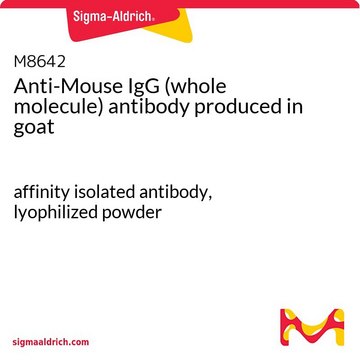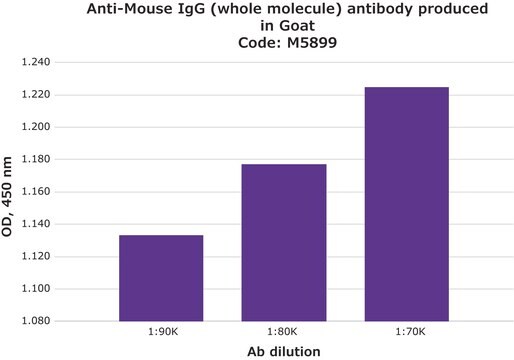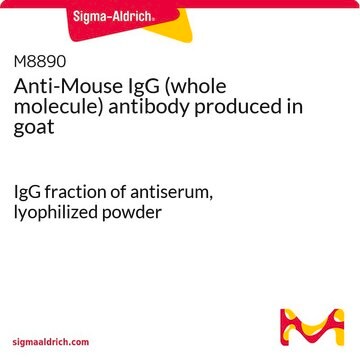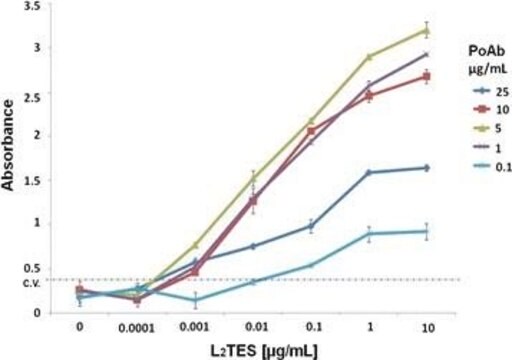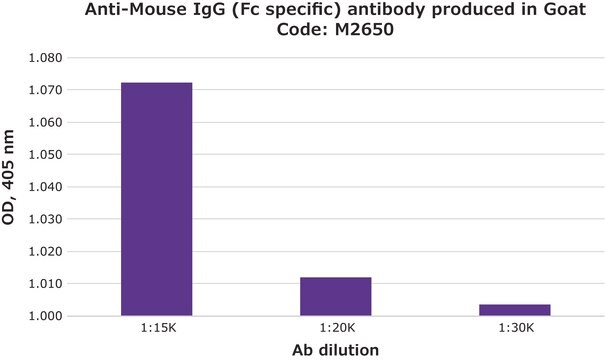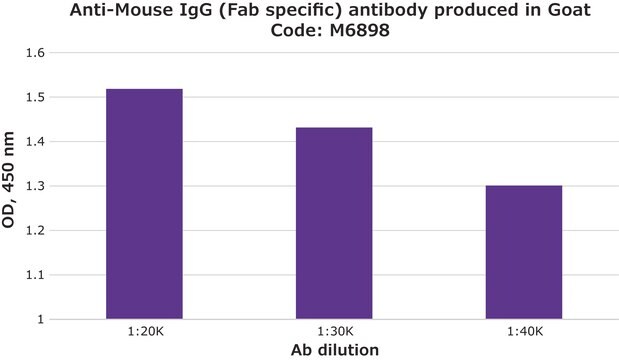M8645
Anti-Mouse IgG (whole molecule) antibody produced in goat
affinity isolated antibody, lyophilized powder
Synonym(s):
Goat Anti-Mouse IgG, Goat IgG Antibody
Sign Into View Organizational & Contract Pricing
All Photos(1)
About This Item
Recommended Products
biological source
goat
Quality Level
conjugate
unconjugated
antibody form
affinity isolated antibody
antibody product type
secondary antibodies
clone
polyclonal
form
lyophilized powder
technique(s)
Ouchterlony double diffusion: suitable
storage temp.
2-8°C
target post-translational modification
unmodified
Looking for similar products? Visit Product Comparison Guide
General description
IgG is the main antibody type found in plasma and extracellular fluid and is expressed on B cell membrane.
Immunoglobulin G (IgG) belongs to the immunoglobulin family and is a widely expressed serum antibody. An immunoglobulin has two heavy chains and two light chains connected by a disulfide bond. It mainly helps in immune defense. It is a glycoprotein. IgG is a major class of immunoglobulin. Mouse consists of five immunoglobulin classes- IgM, IgG, IgA, IgD and IgE. Mouse IgG is further divided into five classes- IgG1, IgG2a, IgG2b and IgG3.
Immunogen
IgG purified from pooled normal mouse serum.
Application
Anti-mouse IgG (whole molecule) antibody (diluted 1:20) can be used in Indirect immunofluorescence. It can also be used as a secondary antibody in western blotting to release NC1 domain of type IV collagen. Further, it can also be used in enzyme immunoassays (50 μgram) .
Anti-mouse IgG (whole molecule) antibody (diluted 1:20) can be used in:
- indirect immunofluorescence
- western blotting to release NC1 domain of type IV collagen
- enzyme immunoassays (50 μgram)
Biochem/physiol Actions
IgG regulates several functions such as phagocytosis and hence plays a pivotal role in facilitating cytological immune responses. Anti-mouse IgG (whole molecule) antibody can be used in T cell proliferation assays. It can also be used in Ouchterlony Double Diffusion and immunoelectrophoresis. Goat anti- mouse IgG (whole molecule) antibody reacts specifically with mouse IgG subclasses IgG1, IgG2a, IgG2b and IgG3. The product has also shown no reactivity to human serum proteins.
Immunoglobulin G (IgG) participates in hypersensitivity type II and type III reactions. IgG helps in opsonization, complement fixation and antibody dependent cell mediated cytotoxicity.
Other Notes
Antibody adsorbed with human serum proteins
Physical form
Lyophilized from 0.01 M sodium phosphate, 0.015 M sodium chloride, pH 7.2
Reconstitution
Reconstitute with 1 mL of 0.135 M sodium chloride.
Disclaimer
Unless otherwise stated in our catalog or other company documentation accompanying the product(s), our products are intended for research use only and are not to be used for any other purpose, which includes but is not limited to, unauthorized commercial uses, in vitro diagnostic uses, ex vivo or in vivo therapeutic uses or any type of consumption or application to humans or animals.
Not finding the right product?
Try our Product Selector Tool.
Choose from one of the most recent versions:
Already Own This Product?
Find documentation for the products that you have recently purchased in the Document Library.
Customers Also Viewed
E M Rust et al.
The Journal of clinical investigation, 103(10), 1459-1467 (1999-05-20)
The direct effects of expressing hypertrophic cardiomyopathy-associated (HCM-associated) mutant troponin T (TnT) proteins on the force generation of single adult cardiac myocytes have not been established. Replication-defective recombinant adenovirus vectors were generated for gene transfer of HCM-associated I79N and R92Q
T Keeley et al.
Zoo biology, 31(3), 275-290 (2011-03-16)
The Vancouver Island marmot (Marmota vancouverensis; VIM) is one of North America's most endangered species with fewer than 150 individuals remaining in the wild. A captive breeding program was established across four facilities in Canada as an insurance population and
Molecular Genetics of Immunoglobulin, 17 (1987)
The Laboratory Rat (2005)
C S von Bartheld et al.
The Journal of neuroscience : the official journal of the Society for Neuroscience, 20(2), 736-748 (2000-01-13)
Anterograde axonal transport of neurotrophins has been demonstrated recently, but to date such transport has only been shown for brain-derived neurotrophic factor and no other endogenous neurotrophin. Endogenous neurotrophin-3 (NT-3) protein is present in the ganglion cell layer of the
Our team of scientists has experience in all areas of research including Life Science, Material Science, Chemical Synthesis, Chromatography, Analytical and many others.
Contact Technical Service